
by Pigeon Patrol | Jan 25, 2022 | Pigeon Droppings, Pigeon Patrol's Services, Pigeon Predators, Pigeon Spikes, Pigeons, Pigeons in the News
Even the bird-brained can follow a leader. When pigeons fly in flocks, each bird falls behind another with better navigational skill, and the savviest among them leads the flock, scientists report in the April 8 Nature.
The research suggests hierarchies can serve peaceful purposes in the animal kingdom, where dominance by brute force is often the rule. “A pecking order tends to be just that — a pecking order,” says Iain Couzin of Princeton University, an expert in collective behavior who was not involved in the research.
The research also suggests that for pigeons, dominance isn’t set in stone. While one bird often emerged as the leader, other birds also stepped up. This flexibility in leadership had previously been seen only in some small groups of fish.
From schools to packs to swarms to flocks, collective behavior is widespread among animals. But in many cases, the important interactions are with nearest neighbors, and control of the group’s movement is distributed among members rather than hierarchical.

Biological physicist Tamás Vicsek of Eötvös Loránd University in Budapest and his colleagues studied flight dynamics in homing pigeons, which fly in flocks but conveniently return to their roosts. The researchers outfitted 13 pigeons with tiny backpacks carrying GPS devices that measured shifts in birds’ flight direction five times per second. Flocks of eight to 10 birds flew with the devices during homing flights (a roughly 14-kilometer trip back to the roost) and spontaneous “free” flights near home. Each bird also flew solo flights of about 15 kilometers each.
Analysis of GPS logs showed that for each excursion, the flock had one leader followed by at least three or four other birds. Each of these followers was in turn followed by other birds in the flock. Comparing the solo flight paths to the group flights showed that the birds with the best navigational skills led the flock.
While flocks have hierarchies, they’re not dictatorships, notes Vicsek. One bird led eight of the 13 flights, while other birds took the lead on the rest of the trips. Vicsek likens the dynamics to a group of peers deciding where to eat dinner. “Maybe someone knows the area restaurants best, or there is a person who’s a gourmand — or maybe they are the most outspoken,” he says. This one person might pick the place to eat for several nights, although another person might chime in now and then. And then there is the person with no say, whom everyone knows has terrible taste in food.
“These pigeons know each other. They know which is the smartest. The fastest bird will even follow the slower one who knows the way home the best,” say Vicsek. Videos of the birds’ positions during flight showed that if the best navigator moves a little to the left, it takes about a third of a second for other birds to do the same. But if the least savvy bird makes a move “the others don’t care,” Vicsek says.
Pigeons’ brains may be wired for follow-the-leader, comments behavioral neuroscientist Lucia Jacobs of the University of California, Berkeley. When the left eye sees something, for example, it sends all the visual information to the right brain hemisphere, and vice versa. This “extreme lateralization” may play a role in organizing flocks, the new work suggests. A pigeon following another was most likely to be flying on its partner’s right, seeing this leader with its left eye. “It’s very cool,” Jacobs says.
Source
Pigeon Patrol Products & Services is the leading manufacturer and distributor of bird deterrent (control) products in Canada. Pigeon Patrol products have solved pest bird problems in industrial, commercial, and residential settings since 2000, by using safe and humane bird deterrents with only bird and animal friendly solutions. At Pigeon Patrol, we manufacture and offer a variety of bird deterrents, ranging from Ultra-flex Bird Spikes with UV protection, Bird Netting, 4-S Bird Gel and the best Ultrasonic and audible sound devices on the market today.
Voted Best Canadian wholesaler for Bird Deterrent products ten years in a row.
Contact us at 1- 877– 4– NO-BIRD, (604) 585-9279 or visit our website at www.pigeonpatrol.ca
Pigeon/Pigeon Patrol / Pigeons Roosting / Vancouver Pigeon Control /Bird Spikes / Bird Control / Bird Deterrent / Pigeon Deterrent? Surrey Pigeon Control / Pest /Seagull deterrent / Vancouver Pigeon Blog / Birds Inside Home / Pigeons in the cities / Ice Pigeons/ What to do about pigeons/ sparrows , Damage by Sparrows, How To Keep Raccoons Away, Why Are Raccoons Considered Pests/ De-fence / Pigeon Nesting/ Bird Droppings / Pigeon Dropping/ woodpecker control/ Professional Bird Control Company/ Keep The Birds Away/ Birds/rats/ seagull/pigeon/woodpecker/ dove/sparrow/pidgeon control/pidgeon problem/ pidgeon control/flying rats/ pigeon Problems/ bird netting/bird gel/bird spray/bird nails/ bird guard
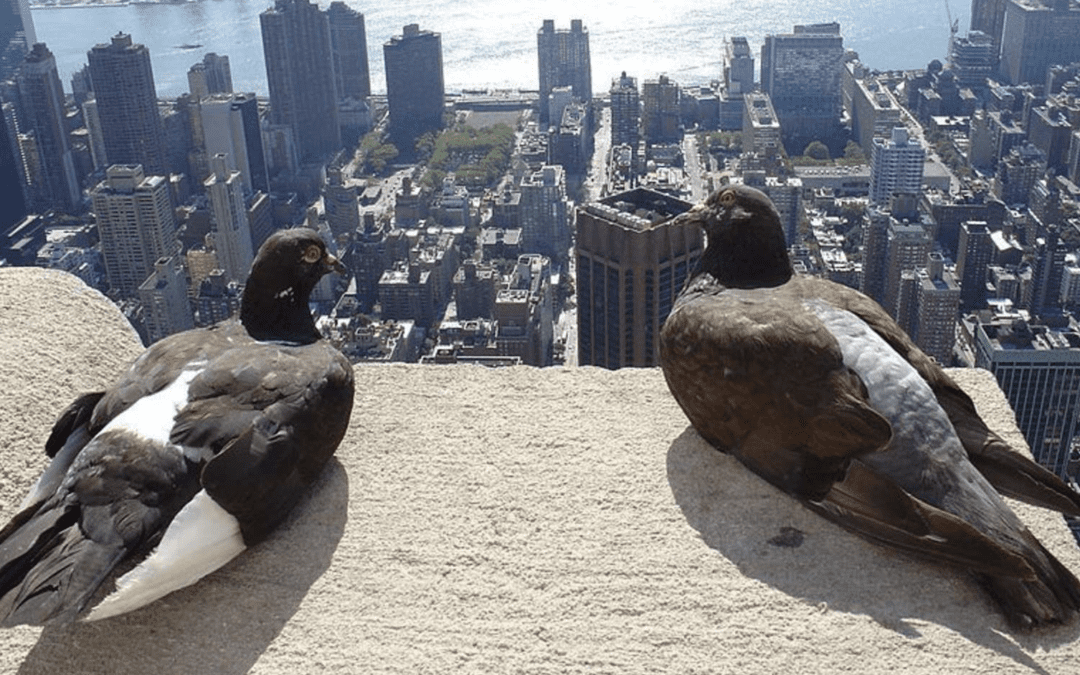
by Pigeon Patrol | Dec 24, 2021 | Pigeon Patrol's Services, Pigeon Predators, Pigeon Spikes, Pigeons, Pigeons in the News
Pigeons may seem harmless, but these pest birds cause millions of dollars in damage every year to buildings, ventilation systems, machinery, statues, roofs, and much more. Bird droppings and nesting materials left by pigeons pose physical problems and health hazards that can become very serious if not corrected quickly making prompt and effective professional bird control is often essential.
Potential Health Hazards:
There are many health risks associated with pigeons and their droppings. The bacteria, fungi, and ectoparasites that they and their droppings harbor are numerous. The four most common ways disease is passed by bird to human are: inhalation of fecal dust, food and water contaminated with bird feces, direct contact with feces, and parasitic transfer.
Pigeon droppings can expose humans to many diseases, including salmonella, Newcastle disease, candidiasis, encephalitis, orthosis, and toxoplasmosis. In addition, they can also carry cryptococcosis, and coccidiodomycosis, which cause meningitis. The droppings may also harbor growth of fungus, which causes histoplasmosis. Fleas, lice, mites, and other pests often live on these birds, hitching a ride to where ever they want to jump off. Pigeons may also attract other pests, such as rats, which feed on dead pigeons and food that well-intentioned bird lovers may scatter for them.
In addition to disease, bird droppings are known for triggering 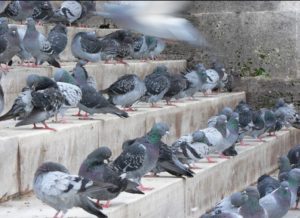 people to slip and fall, which makes it especially important to rid the birds from highly trafficked areas.
people to slip and fall, which makes it especially important to rid the birds from highly trafficked areas.
Damage Caused by Pigeons:
These are messy birds, leaving droppings everywhere they go, particularly near their roost sites. Pigeon droppings are not just gross, they are also full of uric acid which makes them extremely corrosive. The droppings are the direct cause of millions of dollars in damage to buildings and other structures. Particularly vulnerable are painted surfaces, awnings, signs, and other similar surfaces. A tragic example of the corrosiveness of pigeon droppings is the Minnesota bridge accident in 2007, which was found to be the direct result of bird droppings eating away at the metal bridge supports until they weakened.
In addition to the damage cause by their acidic droppings, pigeon nests can also cause damage. Pest birds will often build nests in gutters or on roof corners blocking essential drainage systems. Every year several warehouses experience roof damage, and even collapse, when drainage systems have been blocked and standing water rises just six inches. Bird nests can also block ventilation systems, which not only prevents exhaust of potentially harmful gases, but also has the potential to spread diseases. Fire is also a potential hazard. Nesting materials are usually flammable, consisting of twigs, straw, grasses and dried droppings. When pest birds build their nests inside electric signs or other machinery there is a great risk of fire.
Pigeons are creatures of habit and highly social. Once they have found a cozy spot the will return again and again, bringing along more of their pigeon pals. Prolific breeders, pigeons can hatch several broods a year, sometimes even laying a new clutch before the previous have even hatched. Often our buildings and structures have architectural features such as drain spouts and eaves that make perfect nesting spots for these birds. Pigeons are comfortable around humans and they’re hard to scare away or deter. Once a flock of stubborn unwanted pigeons have set up shop in/on your building, it can be stubbornly resistant to removal, often requiring the services of a pest control or animal control professional. As is true of many pests that invade our homes and businesses, the first step to controlling feral pigeons is to remove their food source.
Tips to deter pigeons:
- Don’t feed the pigeons.
- Screen drains and gutters to make your property less attractive to pigeons.
- Encourage children to pick up spilled food – and teach them NOT to feed pigeons
- Keep areas around trash bins and outdoor dining areas clean
- Eliminate water sources such as bird baths, over-watered lawns, or kiddy pools.
Source
Pigeon Patrol Products & Services is the leading manufacturer and distributor of bird deterrent (control) products in Canada. Pigeon Patrol products have solved pest bird problems in industrial, commercial, and residential settings since 2000, by using safe and humane bird deterrents with only bird and animal friendly solutions. At Pigeon Patrol, we manufacture and offer a variety of bird deterrents, ranging from Ultra-flex Bird Spikes with UV protection, Bird Netting, 4-S Bird Gel and the best Ultrasonic and audible sound devices on the market today.
Voted Best Canadian wholesaler for Bird Deterrent products ten years in a row.
Contact us at 1- 877– 4– NO-BIRD, (604) 585-9279 or visit our website at www.pigeonpatrol.ca
Pigeon/Pigeon Patrol / Pigeons Roosting / Vancouver Pigeon Control /Bird Spikes / Bird Control / Bird Deterrent / Pigeon Deterrent? Surrey Pigeon Control / Pest /Seagull deterrent / Vancouver Pigeon Blog / Birds Inside Home / Pigeons in the cities / Ice Pigeons/ What to do about pigeons/ sparrows , Damage by Sparrows, How To Keep Raccoons Away, Why Are Raccoons Considered Pests/ De-fence / Pigeon Nesting/ Bird Droppings / Pigeon Dropping/ woodpecker control/ Professional Bird Control Company/ Keep The Birds Away/ Birds/rats/ seagull/pigeon/woodpecker/ dove/sparrow/pidgeon control/pidgeon problem/ pidgeon control/flying rats/ pigeon Problems/ bird netting/bird gel/bird spray/bird nails/ bird guard
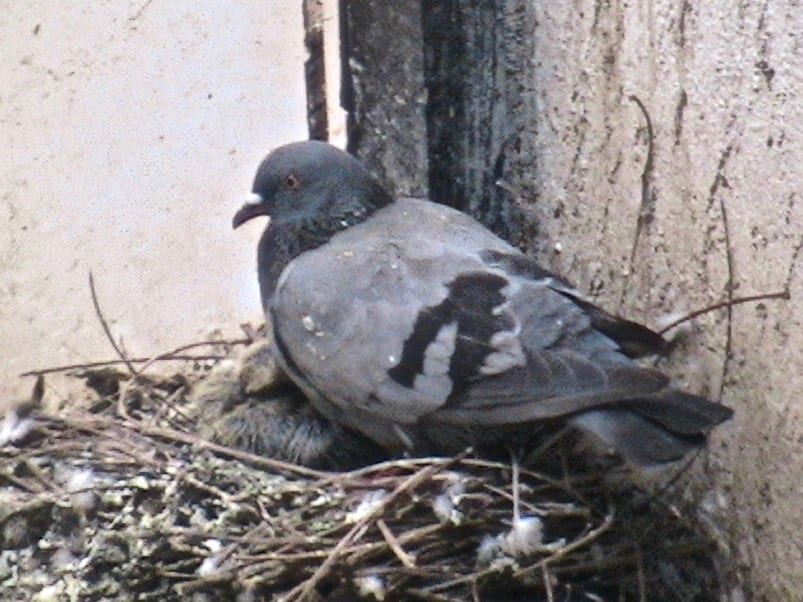
by Pigeon Patrol | Dec 24, 2021 | history of pigeons, MBCA, pet bird, Pigeon Control, Pigeon Droppings, Pigeon Patrol's Services
In January 2019, a child died in a Scottish hospital after developing a fungal infection caused by exposure to pigeon droppings. An elderly patient also died in the same hospital of another condition that was exacerbated by exposure to pigeon droppings. It was determined that both patients were exposed to the contaminants via the ventilation system, which was found to contain pigeon droppings. These deaths brought to the forefront a question that many people who are living with pigeon infestations have: in addition to being disruptive, are pigeons actually dangerous? Here are the facts you need to know.
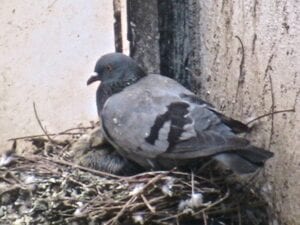
Pigeon droppings contain bacteria and fungi that can cause disease.
Exposure to pigeon droppings can lead to a number of different diseases. Some of the most common infections associated with pigeons are:
· E. coli: E. coli infections are usually the result of pigeon droppings being present in water or in food that is later consumed. This infection causes nausea, abdominal cramps, fever, and vomiting.
· Histoplasmosis: This is a dangerous fungal infection that affects the lungs, or rarely, other parts of the body. It causes flu-like symptoms, including fever, shortness of breath, chest pain, fatigue, and loss of appetite. It can be fatal in severe cases.
· Cryptococcus: This is another fungal infection that affects the lungs and can spread to the brain. In its early stages, it can cause a cough, chest pain, fever, and shortness of breath. When it spreads to the lungs, it causes headaches, neck pain, changes in behavior, confusion, and sensitivity to light. It can also be fatal.
· Psittacosis: Psittacosis is a bacterial infection that causes fever, headaches, a rash, and can lead to pneumonia, if left untreated.
· Candidiasis: This fungal infection can affect multiple parts of the body, including the mouth, lungs, urogenital tract, and skin. This infection may require prolonged periods of antifungal medications to treat.
· Salmonellosis: Pigeon droppings may contain the bacteria salmonella, which can cause this infection. Typically, people are exposed to these bacteria when pigeon droppings come into contact with food or food preparation surfaces. This infection causes nausea, vomiting, and abdominal cramps.
Pigeons also carry other potential health risks.
It is not just the droppings of pigeons that are dangerous. Pigeons themselves can carry mites and fleas, which can then attach to your pets or enter your home, causing skin irritation and itchiness. They can also spread infections through bites that are dangerous to both people and pets.
Pigeons can also carry West Nile virus. Although people are unlikely to contract West Nile virus directly from pigeons, it is still important to avoid removing any dead pigeons from your property without the help of a professional for this reason.
People with weakened immune systems are most at risk.
The infections that pigeons are likely to transmit do not affect everyone at the same rate. Many healthy adults are able to fight off infections caused by exposure to bacteria and fungi from pigeon droppings. If they do become ill, then they are likely to have very mild infections.
However, although it is always possible for someone who is healthy to become very ill from these conditions, other people are more at risk. Infants and children are more likely to experience severe symptoms when they are exposed to a disease via pigeon droppings. People who are immuno-compromised, such as people with HIV or who are undergoing chemotherapy, also have a higher risk of developing severe symptoms and complications. Lastly, the elderly are prone to severe symptoms from pigeon-related diseases.
Even without exposure to a disease, some people may have allergy symptoms, including respiratory problems, rashes, and itchiness, as a result of a pigeon infestation near their home or business.
For safety reasons, only professionals should handle pigeon control.
If you have a pigeon infestation, it’s important to deal with the issue as soon as possible. However, trying to get rid of pigeons and clean up their droppings on your own is not safe. Pigeon control professionals are trained in safe management techniques and have the proper equipment required to clean up after a pigeon infestation safely.
One of the biggest risks of cleaning up pigeon droppings on your own is that you could release dust into the air that contains bacteria and fungi that cause infection. Not only would you be at risk from inhaling the bacteria and fungi yourself, but you could also inadvertently introduce the contaminants into the HVAC system in your home, allowing them to spread into your indoor air and putting your family at risk.
Source
Pigeon Patrol Products & Services is the leading manufacturer and distributor of bird deterrent (control) products in Canada. Pigeon Patrol products have solved pest bird problems in industrial, commercial, and residential settings since 2000, by using safe and humane bird deterrents with only bird and animal friendly solutions. At Pigeon Patrol, we manufacture and offer a variety of bird deterrents, ranging from Ultra-flex Bird Spikes with UV protection, Bird Netting, 4-S Bird Gel and the best Ultrasonic and audible sound devices on the market today.
Voted Best Canadian wholesaler for Bird Deterrent products ten years in a row.
Contact us at 1- 877– 4– NO-BIRD, (604) 585-9279 or visit our website at www.pigeonpatrol.ca
Pigeon/Pigeon Patrol / Pigeons Roosting / Vancouver Pigeon Control /Bird Spikes / Bird Control / Bird Deterrent / Pigeon Deterrent? Surrey Pigeon Control / Pest /Seagull deterrent / Vancouver Pigeon Blog / Birds Inside Home / Pigeons in the cities / Ice Pigeons/ What to do about pigeons/ sparrows , Damage by Sparrows, How To Keep Raccoons Away, Why Are Raccoons Considered Pests/ De-fence / Pigeon Nesting/ Bird Droppings / Pigeon Dropping/ woodpecker control/ Professional Bird Control Company/ Keep The Birds Away/ Birds/rats/ seagull/pigeon/woodpecker/ dove/sparrow/pidgeon control/pidgeon problem/ pidgeon control/flying rats/ pigeon Problems/ bird netting/bird gel/bird spray/bird nails/ bird guard

by Pigeon Patrol | Dec 16, 2021 | 4-S Gel Bird repellent, Animal Deterrent Products, Bird Deterrent Products, Bird Law, Bird Netting, Pigeon Droppings, Pigeon Patrol's Services, Pigeon Predators, Pigeon Spikes
All birds should be hatched wild and live and fly free but unfortunately many don’t. Whether they are our pets because they are domestic or because they are rescued from the wild, they can’t free fly safely. We would break your heart with all the stories of pet birds lost. And how they suffer.
The biggest risk to a pet pigeon or dove is getting outside and being killed by a predator before he can get back in to safety. Wild pigeons derive all their security from being part of a flock that stays alert watching out for predators and knows what to do (and has the education and physiology to do) what is needed when under attack. A pigeon alone is extremely vulnerable. A domestic pigeon outside alone is in imminent danger. It is unsafe to take a pet pigeon outside unprotected. They need to be in an aviary or in the house.
Your pet pigeon or dove doesn’t want to get lost but many do, especially when allowed to hang around outside in the backyard or ride along unprotected on their person’s shoulder. And clipped wings do not protect birds outside. Birds are by their very nature aerodynamic and being outside unprotected with clipped wings is no safer. One little startle and, with the air currents outdoors, they are airborne. And in danger. Wild pigeons and doves derive all of their security from their survival of the fittest DNA, their education growing up in the wild and from being a part of a flock. Your pet pigeon, even if hatched wild, is at terrible risk if permitted to free fly. You (and your dogs and your patio cover, etc. etc.) offer no protection to pet birds, only an illusion of safety. We too wish your pet could fly free but the odds of tragedy are very high. It is just too great a risk.

Reprinted from the Palomacy Help Group, written by Ashley Dietrich
We’re discussing free-flying pet pigeons, and why not to do it.
It sounds great, right? These fantastic fliers, out in the fresh air, doing what nature intended? It sounds wonderful, and I wish I could give my birds the whole sky to enjoy. While pigeons and doves DO need exercise and sunlight, these needs can be met with a predator-proof aviary, out-of-cage time indoors, secure leashes, etc. Here are the reasons Palomacy advocates against allowing domestic birds outdoors un-caged/un-tethered:
1. Predators
— Hawks – they’re everywhere. I’ve read a report about a hawk grabbing a parrot off of an owner’s shoulder. Raptors focus tightly on their intended prey, swoop in, and won’t always notice or care if a human is nearby. Two years ago, a small hawk tried to get my dove Cecily as she sat inside the screen of my open window, sunning after a bath – I was sitting less than 3 feet away. My windows are now covered in hardware cloth in addition to the basic window screens, so it is safe to open the glass. I live in the woods, but hawks are city birds too.
— Cats and Dogs. Even with the benefit of wild instincts, countless birds fall victim to outdoor cats and dogs. Cat attacks are the #1 human-related cause of bird mortality. I’ve seen this first-hand too many times as a wildlife rehabber, and I’ll spare you the gory details.
2. Birds can get lost
Birds are more difficult to retrieve than 4-legged pets. It’s easy for something to spook a bird – if they go too high or too far, it can be even harder to get them back. They can cover more distance, quickly – and a bit of wind exacerbates this problem. The tamest of birds could bolt if startled, and not all pigeons have a homing instinct. Adding to the complications, many people do not realize they are pets, so birds are less likely to get help from strangers. The pigeons and doves I have retrieved after they were found outdoors have all been suffering from dehydration or hunger to some degree. They cannot find food and water in the wild.
Source
Pigeon Patrol Products & Services is the leading manufacturer and distributor of bird deterrent (control) products in Canada. Pigeon Patrol products have solved pest bird problems in industrial, commercial, and residential settings since 2000, by using safe and humane bird deterrents with only bird and animal friendly solutions. At Pigeon Patrol, we manufacture and offer a variety of bird deterrents, ranging from Ultra-flex Bird Spikes with UV protection, Bird Netting, 4-S Bird Gel and the best Ultrasonic and audible sound devices on the market today.
Voted Best Canadian wholesaler for Bird Deterrent products ten years in a row.
Contact us at 1- 877– 4– NO-BIRD, (604) 585-9279 or visit our website at www.pigeonpatrol.ca
Pigeon/Pigeon Patrol / Pigeons Roosting / Vancouver Pigeon Control /Bird Spikes / Bird Control / Bird Deterrent / Pigeon Deterrent? Surrey Pigeon Control / Pest /Seagull deterrent / Vancouver Pigeon Blog / Birds Inside Home / Pigeons in the cities / Ice Pigeons/ What to do about pigeons/ sparrows , Damage by Sparrows, How To Keep Raccoons Away, Why Are Raccoons Considered Pests/ De-fence / Pigeon Nesting/ Bird Droppings / Pigeon Dropping/ woodpecker control/ Professional Bird Control Company/ Keep The Birds Away/ Birds/rats/ seagull/pigeon/woodpecker/ dove/sparrow/pidgeon control/pidgeon problem/ pidgeon control/flying rats/ pigeon Problems/ bird netting/bird gel/bird spray/bird nails/ bird guard

by Pigeon Patrol | Dec 16, 2021 | history of pigeons, MBCA, pet bird, Pigeon Control, Pigeon Droppings, Pigeon Patrol's Services, Pigeon Predators
When the leader of a flock goes the wrong way, what will the flock do?
With human beings, nobody can be sure. But with homing pigeons, the answer is that they find their way home anyway.

Either the lead pigeon recognizes that it has no clue and falls back into the flock, letting birds that know where they are going take over, or the flock collectively decides that the direction that it is taking just doesn’t feel right, and it doesn’t follow.
Several European scientists report these findings in a stirring report in Biology Letters titled, “Misinformed Leaders Lose Influence Over Pigeon Flocks.”
Isobel Watts, a doctoral student in zoology at Oxford, conducted the study with her advisers, Theresa Burt de Perera and Dora Biro, and with the participation of Mate Nagy, a statistical physicist from Hungary, who is affiliated with several institutions, including Oxford and the Hungarian Academy of Sciences.
Dr. Biro, who studies social behavior in primates as well as pigeons, said that the common questions that ran through her work were “about group living and what types of challenges and opportunities it brings.”
She and her colleagues at Oxford have pioneered a method of studying flock behavior that uses very-fine-resolution GPS units, which the birds wear in pigeon-size backpacks.
The devices record a detailed position for each bird a number of times a second. Researchers in Budapest and Oxford developed software to analyze small movements and responses of every bird in a flock.
With this method, the scientists can identify which pigeons are leading the way. They can build a picture of how each bird responds to changes in the flight of other birds.
The consistent leaders were often fast fliers and occupied the first position in the group of flying birds. Other birds followed them.
But what if one day, a leader flew in the wrong direction?
The researchers arranged to feed the leaders misinformation by putting them in lofts with artificial light for a few days. By shifting when the lights went on and off, compared with the actual external schedule of light and dark, the researchers could shift the pigeons’ internal clocks a few hours forward or back.
Pigeons navigate by using the position of the sun and an internal clock, so the change in the clock threw off their sense of direction and they didn’t fly toward home at all.
But the pigeon flock corrected its flight path, and went the right way.
Dr. Biro doesn’t know exactly how they corrected. The followers all had the right information, so they might have collectively said, “this guy’s wrong, let’s not follow him,” Dr. Biro said.
“Or, the leader said, ‘Something’s wrong here,’” and fell back into the flock, “effectively choosing not to lead,” Dr. Biro said, and another pigeon, that knew the time of day, led the way.
Sadly, these kinds of decisions by pigeon flocks offer no reassurance to humans who think political leaders are misinformed or misdirected.
The pigeons don’t communicate directly about where they are flying. The flock changes its flight path because of split-second reactions to position changes by other birds. There’s no decision-making process remotely similar to, say, an election.
But knowledge of how the pigeons work might be useful in creating swarms of small robots for activities like search and rescue. If researchers can reduce the decision-making process of a flock to a few simple rules about who follows whom, and when, those rules might be applied to robot groups.
Then the group of robots might be able to make some of its own decisions, at least about where to go or how to get there.
Source
Pigeon Patrol Products & Services is the leading manufacturer and distributor of bird deterrent (control) products in Canada. Pigeon Patrol products have solved pest bird problems in industrial, commercial, and residential settings since 2000, by using safe and humane bird deterrents with only bird and animal friendly solutions. At Pigeon Patrol, we manufacture and offer a variety of bird deterrents, ranging from Ultra-flex Bird Spikes with UV protection, Bird Netting, 4-S Bird Gel and the best Ultrasonic and audible sound devices on the market today.
Voted Best Canadian wholesaler for Bird Deterrent products ten years in a row.
Contact us at 1- 877– 4– NO-BIRD, (604) 585-9279 or visit our website at www.pigeonpatrol.ca
Pigeon/Pigeon Patrol / Pigeons Roosting / Vancouver Pigeon Control /Bird Spikes / Bird Control / Bird Deterrent / Pigeon Deterrent? Surrey Pigeon Control / Pest /Seagull deterrent / Vancouver Pigeon Blog / Birds Inside Home / Pigeons in the cities / Ice Pigeons/ What to do about pigeons/ sparrows , Damage by Sparrows, How To Keep Raccoons Away, Why Are Raccoons Considered Pests/ De-fence / Pigeon Nesting/ Bird Droppings / Pigeon Dropping/ woodpecker control/ Professional Bird Control Company/ Keep The Birds Away/ Birds/rats/ seagull/pigeon/woodpecker/ dove/sparrow/pidgeon control/pidgeon problem/ pidgeon control/flying rats/ pigeon Problems/ bird netting/bird gel/bird spray/bird nails/ bird guard
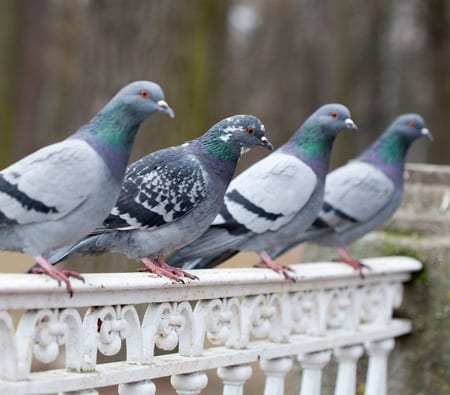
by Pigeon Patrol | Nov 30, 2021 | Bird Spike, Pigeon Droppings, Pigeon Patrol's Services, Pigeon Predators, Pigeon Spikes, Pigeons, Pigeons in the News
Pigeons predominantly feed on grains and cereals, thus they can consume quickly any grainy foods lift in the open. Aside from grains and cereals, Pigeons are known to feed on small insects as well as earthworms . Pigeons can feed on small Kentucky rats , lizards and many other reptiles, they can also carry these small animals in their claws or feet through hundreds of miles during flights until they reach their destination and without losing grip of such animals.
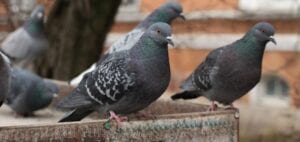
The question of feeding pigeon or not will largely depends on whether the bird is domesticated or not. While domesticated Louisville pigeons can be fed at a restricted area of a property, free-roaming pigeons must never be fed. Domesticated pigeons must only be fed if they are very few (between 1 and 5), however, feeding domesticated Kentucky pigeons may attract the attention of other pigeons , thus the population of pigeons around your property may soar within a short period of time.
Feeding of Louisville pigeons are widely discourage because of the possibility of such birds causing damages to different compartments of a property during flight. When you feed pigeons, they will end up defecating on your roof, similarly, they will end up roosting and building nests close to you property because they have a ready source of food. Feeding Kentucky pigeons around your property also means that they will eventually gain access to other places such as the patio, deck, and garage.
When you feed pigeons close to your Louisville property, they will get used to migrating there in search of food, and when you are not around, they may decide to fly through your door or window. Feeding pigeons within your Kentucky property will increase the chances of the birds gaining access to the attic or the chimney at the top , where they can easily roost and establish their nests. Even when your pigeons are domesticated, you must only feed them in their cages and not outside of their abode, this will reduce their chances of accessing your roof, since they are used to eating in their bowls or troughs , inside their cages.
Feeding Kentucky pigeons is discouraged in every way because of the enormous damages they tend to cause in and outside of properties. The birds are aggressive in nature, and their droppings can get too much to the extent of making roofs to cave in. Pigeon damages reduce the value of homes and can cause thousands of dollars in damages.
Source
Pigeon Patrol Products & Services is the leading manufacturer and distributor of bird deterrent (control) products in Canada. Pigeon Patrol products have solved pest bird problems in industrial, commercial, and residential settings since 2000, by using safe and humane bird deterrents with only bird and animal friendly solutions. At Pigeon Patrol, we manufacture and offer a variety of bird deterrents, ranging from Ultra-flex Bird Spikes with UV protection, Bird Netting, 4-S Bird Gel and the best Ultrasonic and audible sound devices on the market today.
Voted Best Canadian wholesaler for Bird Deterrent products ten years in a row.
Contact us at 1- 877– 4– NO-BIRD, (604) 585-9279 or visit our website at www.pigeonpatrol.ca
Pigeon/Pigeon Patrol / Pigeons Roosting / Vancouver Pigeon Control /Bird Spikes / Bird Control / Bird Deterrent / Pigeon Deterrent? Surrey Pigeon Control / Pest /Seagull deterrent / Vancouver Pigeon Blog / Birds Inside Home / Pigeons in the cities / Ice Pigeons/ What to do about pigeons/ sparrows , Damage by Sparrows, How To Keep Raccoons Away, Why Are Raccoons Considered Pests/ De-fence / Pigeon Nesting/ Bird Droppings / Pigeon Dropping/ woodpecker control/ Professional Bird Control Company/ Keep The Birds Away/ Birds/rats/ seagull/pigeon/woodpecker/ dove/sparrow/pidgeon control/pidgeon problem/ pidgeon control/flying rats/ pigeon Problems/ bird netting/bird gel/bird spray/bird nails/ bird guard




 people to slip and fall, which makes it especially important to rid the birds from highly trafficked areas.
people to slip and fall, which makes it especially important to rid the birds from highly trafficked areas.





